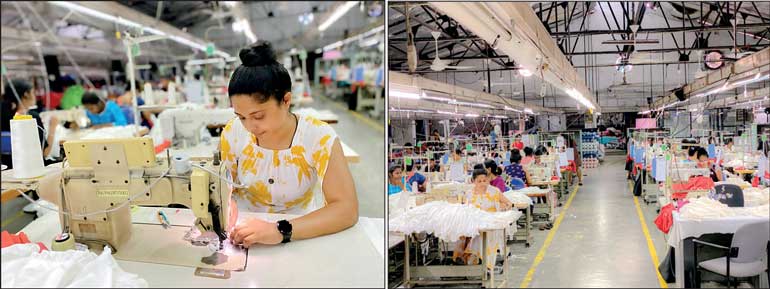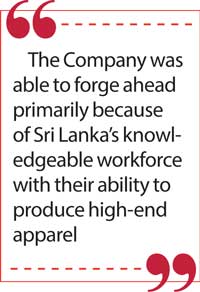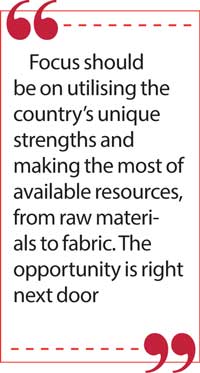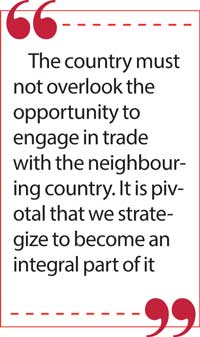Sunday Apr 20, 2025
Sunday Apr 20, 2025
Wednesday, 1 November 2023 00:30 - - {{hitsCtrl.values.hits}}


John De Silva
 With global economic challenges impacting Sri Lanka’s apparel sector, small and medium enterprises (SMEs) are moving from the drawing board into realisation of envisaged plans with numerous options to weather the cascading impacts of declining orders. Jia Moda for example is seeing potential opportunities in the Indian market.
With global economic challenges impacting Sri Lanka’s apparel sector, small and medium enterprises (SMEs) are moving from the drawing board into realisation of envisaged plans with numerous options to weather the cascading impacts of declining orders. Jia Moda for example is seeing potential opportunities in the Indian market.
Located in the suburbs of Colombo, Jia Moda is a study in resilience, where for over 20 years it has provided employment to over 250 individuals, most of whom have been with the company since inception.
Jia Moda Founder and Managing Director John De Silva, who first launched his company in Paris, made a conscious decision to shift his manufacturing base to Sri Lanka. He cites the latent talent that could be developed to create high-end apparel by merging his European experience and knowledge as the competitive edge Sri Lanka has.
The Paris based De Silva stated that the company was able to forge ahead primarily because of Sri Lanka’s knowledgeable workforce, “with their ability to produce high-end apparel, which we leveraged with strong partnerships we have built with our buyers over the years. Most of our buyers are located in neighbouring India.”
Explaining further he said, “One cannot overlook the potential of trading with India. Jia Moda’s export capacity to India has significantly grown and now accounts for 80% of our output. However, there is further room for expansion if we fully leverage the ISFTA (Indo-Sri Lanka Free Trade Agreement).”
De Silva stated that Jia Moda is in the process of launching an online platform specifically catering to the Indian market, as a measure to enter into the retail market further under the brand Jia Moda. “Plans are afoot to open an additional two new outlets in Sri Lanka and in Paris.”
India is one of Sri Lanka’s largest export partners, with over $ 800 million in trade carried out in 2022, showing a notable increase in textile imports. This increase is not limited to raw materials but includes finished goods. However, Sri Lanka is permitted to export only 8 million pieces of ready-made apparel to India without applicable duties. The Joint Apparel  Association Forum (JAAF) has consistently called for the possibility of increasing the quota to allow Sri Lanka to use this as an avenue to boost its apparel exports to India.
Association Forum (JAAF) has consistently called for the possibility of increasing the quota to allow Sri Lanka to use this as an avenue to boost its apparel exports to India.
At a recent event, the Chairman of JAAF Sharad Amalean revealed that discussions are being held with relevant Government counterparts to revisit the ISFTA, stating that the country must not overlook the opportunity to engage in trade with the neighbouring country. “It is pivotal that we strategize to become an integral part of it,” he said. “This will be especially crucial for SMEs, which have been essential for the continued development of Sri Lanka’s apparel sector and have felt most of the impact with the recent decline in orders in apparel exports.” In Sri Lanka, approximately 80% of SMEs work in partnership with larger export firms.
Jia Moda has embraced the opportunity to work with this $ 24 billion Indian apparel market, given that it opens opportunities and allows the company to subcontract for major brands and be an integral stakeholder in the fashion industry.
“Sri Lanka’s potential should be harnessed wisely,” stressed De Silva. “Instead of chasing low-value exports, the focus should be on utilising the country’s unique strengths and making the most of available resources, from raw materials to fabric. The opportunity is right next door.”

Discover Kapruka, the leading online shopping platform in Sri Lanka, where you can conveniently send Gifts and Flowers to your loved ones for any event including Valentine ’s Day. Explore a wide range of popular Shopping Categories on Kapruka, including Toys, Groceries, Electronics, Birthday Cakes, Fruits, Chocolates, Flower Bouquets, Clothing, Watches, Lingerie, Gift Sets and Jewellery. Also if you’re interested in selling with Kapruka, Partner Central by Kapruka is the best solution to start with. Moreover, through Kapruka Global Shop, you can also enjoy the convenience of purchasing products from renowned platforms like Amazon and eBay and have them delivered to Sri Lanka.
Discover Kapruka, the leading online shopping platform in Sri Lanka, where you can conveniently send Gifts and Flowers to your loved ones for any event including Valentine ’s Day. Explore a wide range of popular Shopping Categories on Kapruka, including Toys, Groceries, Electronics, Birthday Cakes, Fruits, Chocolates, Flower Bouquets, Clothing, Watches, Lingerie, Gift Sets and Jewellery. Also if you’re interested in selling with Kapruka, Partner Central by Kapruka is the best solution to start with. Moreover, through Kapruka Global Shop, you can also enjoy the convenience of purchasing products from renowned platforms like Amazon and eBay and have them delivered to Sri Lanka.